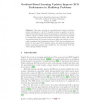272 search results - page 13 / 55 » Parallel Reinforcement Learning with Linear Function Approxi... |
ICML
2009
IEEE
16 years 3 months ago
2009
IEEE
Approximate Linear Programming (ALP) is a reinforcement learning technique with nice theoretical properties, but it often performs poorly in practice. We identify some reasons for...
147
click to vote
ICML
1999
IEEE
16 years 3 months ago
1999
IEEE
Excerpted from: Boyan, Justin. Learning Evaluation Functions for Global Optimization. Ph.D. thesis, Carnegie Mellon University, August 1998. (Available as Technical Report CMU-CS-...
130
click to vote
ICML
2004
IEEE
16 years 3 months ago
2004
IEEE
We consider learning in a Markov decision process where we are not explicitly given a reward function, but where instead we can observe an expert demonstrating the task that we wa...
126
click to vote
GECCO
2004
Springer
15 years 7 months ago
2004
Springer
This paper introduces a gradient-based reward prediction update mechanism to the XCS classifier system as applied in neuralnetwork type learning and function approximation mechani...
116
click to vote
ICRA
2009
IEEE
15 years 9 months ago
2009
IEEE
Abstract— Continuous action sets are used in many reinforcement learning (RL) applications in robot control since the control input is continuous. However, discrete action sets a...

